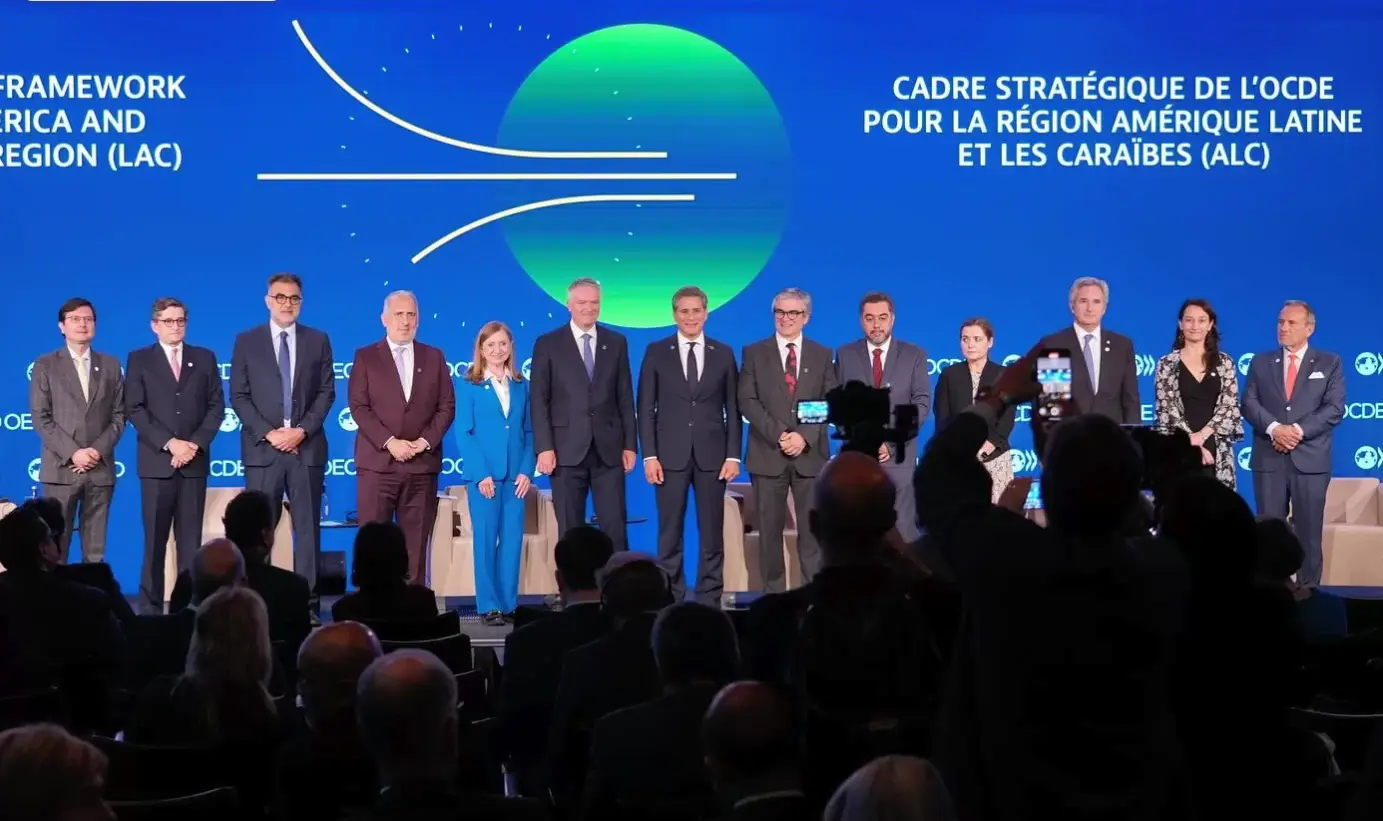The adoption of the Strategic Framework of the Organisation for Economic Co-operation and Development (OECD) for Latin America and the Caribbean stands out as one of the most significant outcomes of the OECD’s annual Ministerial Council Meeting (MCM), held on June 3 and 4 under the chairmanship of Costa Rica. This marks both a destination and a starting point in the evolution and transformation of the relationship between the OECD and the region. Understanding this Framework—and the path that led to its adoption—requires us to ask key questions and consider different perspectives and approaches.
The OECD was born from the ashes of World War II, as part of the Marshall Plan’s effort to build peace through development and shared economic prosperity, and to shape policy standards via a cycle of standard setting, monitoring, and cooperation.
The OECD’s essence is defined by the “E” for economy and the “D” for development. Operationally, it is shaped by the “C” for cooperation—a dynamic that plays out not only internally, among its member states and societies, but also externally, through its engagement with the broader international system and other relevant actors. The “O” for organisation implies institutional structure and rules-based functioning at home, combined with a willingness to act externally.
International cooperation and engagement are not only key to global governance and the provision of global public goods; they are also essential for addressing shared challenges. These include ecological, demographic, digital, and social transitions, as well as the path toward sustainable development. Further pressing challenges such as climate change, socioeconomic and gender inequality, and artificial intelligence require collective solutions for the future of humanity and the planet.
While the OECD’s founding members represented around 65% of global GDP, today they account for only about 35%. This shift highlights the importance of membership expansion, accession negotiations, and external/global relations for fulfilling the organisation’s founding purpose, as reaffirmed in the 2021 Vision Statement marking its 60th anniversary.
Within this context, the ongoing accession negotiations with Argentina, Brazil, Bulgaria, Croatia, Indonesia, Peru, Romania, and Thailand—and the OECD’s global relations strategy, reflected in the design and implementation of cooperation instruments—take on full significance. It is within this same framework that the OECD’s relationship with Latin America and the Caribbean must be understood.
This broader view invites us to consider how the OECD’s global and external relations are being shaped and how its instruments are being developed. These efforts seek both to contribute to global governance and public goods and to ensure balanced geographic representation. In addition to partnerships with key countries—such as Brazil, China, India, Indonesia, and South Africa—and individual country programs, regional programs play a fundamental role. The OECD launched its first regional initiative in 2014 for Southeast Asia, followed in 2016 by the OECD Latin America and the Caribbean Regional Programme (LACRP), which has become a key platform for cooperation and global engagement with the region.
Looking back as the program approaches its tenth anniversary in 2026, it is worth highlighting the substantial cooperation built around four main pillars: productivity, social inclusion, governance, and environmental sustainability. Also noteworthy are the ministerial summits focused on these themes. The institutional structure of the program—anchored in a Steering Committee and Advisory Council that brings together OECD members and Latin American countries from its Development Centre—is crucial. This structure is led by rotating co-presidencies, each pairing one OECD member and one non-member from Latin America. Colombia and Paraguay currently hold these positions, to be succeeded by Costa Rica and Uruguay at the next ministerial summit in Asunción this November.
Looking ahead, following the adoption of the OECD’s Africa Partnership and its Strategic Framework for the Indo-Pacific—both developed at prior annual council meetings—the adoption of the Strategic Framework for Latin America and the Caribbean addresses the need for geographic balance. But it goes further. With Argentina, Brazil, and Peru in the process of joining the organisation, OECD membership could soon represent 76% of the region’s population and 80% of its GDP; 80% of the population and 92% of GDP in the Ibero-American system; and 84% of the population and 96% of GDP in the Inter-American system. This represents a qualitative and paradigm-shifting transformation: the OECD is becoming an organisation of and for Latin America and the Caribbean—and this potential must now be fully realised.
With its clear articulation of shared goals and interests, principles for renewed engagement, and implementation mechanisms, the Strategic Framework is both a statement of intent and a concrete tool for advancing the partnership. It is simultaneously a destination and a new beginning—an inflection point.
It is the culmination of a process that began with an ambitious vision and led to a negotiated consensus among all OECD member states. Now comes the dual challenge of developing an Implementation Plan, to be presented at the 2026 MCM, that brings the Framework’s vision into action and gives political and operational momentum to OECD engagement with—and within—the region. In parallel, the 2026 Regional Programme Ministerial Meeting—marking the program’s tenth anniversary—should be a moment for globally reframing and relaunching the relationship. Spain, as Pro Tempore Secretariat of the 2026 Ibero-American Summit, has offered to host the meeting.
As accession negotiations move forward—toward a transformation in the Latin American character and dimension of the OECD—the region must now define a roadmap that will turn this potential into reality. Only then can we move toward shaping better policies for better lives for all, in development and shared humanity.
*Machine translation, proofread by Ricardo Aceves.













